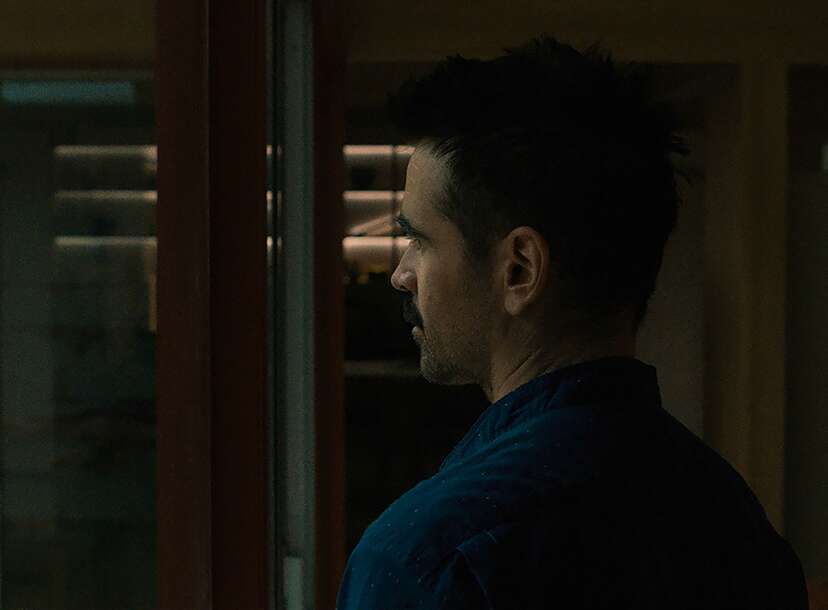'After Yang' Is a Stunning Sci-Fi Fable About Identity and Humanity
The A24 release starring Colin Farrell and Jodie Turner-Smith is one of the year's first great films.

In the Korean filmmaker Kogonada's second feature, After Yang, the characters speak in somber tones. They live in gorgeous, pristine dwellings, with design heavily influenced by Asian cultures despite this ostensibly being a future America where humans exist alongside techno-sapiens, aka robots, as well as clones. But amid the muted tinges of the film's first minutes, the opening credits contain an explosion of color.
Jake (Colin Farrell), Kyra (Jodie Turner-Smith), their adoptive daughter Mika (Malea Emma Tjandrawidjaja), and her techno-sapien big brother Yang (Justin H. Min) suit up and participate in something called "family dance." Kogonada never defines exactly what this tradition is, but it appears to be a virtual Dance Dance Revolution-style competition that happens across the globe or at least within the community where this story takes place. The screen is flush with neon as Farrell and Turner-Smith execute awkward moves, but it soon cuts to other families, each containing characters we will meet as the narrative progresses. They also move in sync to blaring music. When our protagonists are eliminated, something is clearly wrong: Yang doesn't stop moving. Something in his system has broken.
This introduction—astoundingly joyful but also somehow distant—plunges the audience into Kogonada's world, one that is deceptively close to our own but altered by technological progress and an undefined yet seemingly new geopolitical relationship with China. He never clarifies what led to the international city that seems to have developed, but it serves as a disconcerting backdrop for a saga about what humanity and identity means in an age when the boundaries that determine such things are dissolving.
Based on a short story by Alexander Weinstein, After Yang follows Jake as he journeys around this unidentified city trying to repair Yang, which turns out to require a dive into the robot's memories, revealing a life his current family never knew he had. Jake and Kyra purchased Yang as a sibling for Mika, one who could be her caretaker and companion, while also educating her about her own Chinese culture. The couple—whose relationship has its own subtle tensions—knew Yang had a previous owner, which means they can't send him back to the company from which he originated for an easy fix. Mika, meanwhile, is devastated, longing for a person she never distinguished from any other.
As Jake, who runs a sparsely occupied tea store, Farrell projects a weariness in every shot as he tries to unpack Yang's illness and his history. Without any exposition, you can pick out his complicated motives. He is desperate for his daughter's happiness, but he also valued Yang as both a friend and an extra hand around the house. Yang essentially helped to raise this forceful little girl, at once allowing Jake to be a more inattentive parent and truly opening up Mika's curiosity. It is judiciously simple work on the part of Farrell, an actor who seems to tap more depths as his career progresses.
Kogonada, who made the equally exquisite 2017 indie Columbus, loves a wide shot that reveals the architecture of his spaces, allowing characters to creep into the frame almost surreptitiously. It's a style that matches the way Konogada unravels the layers of Yang's history, opening up doors that Jake and Kyra never knew existed. It's without question a beautiful film, and that beauty is augmented with a theme by the great composer Ryuichi Sakamoto, a score by musician Aska Matsumiya, and an original song performed by Mitski and written by Takeshi Kobayashi, which recurs throughout the action. But there's an ugliness that Konogada allows to lurk at the corners of these images—questions of xenophobia and human-rights abuses that go unnamed but are left lingering via snippets of dialogue.
You may also like
It's all part of the enveloping experience of After Yang. It's unrepentantly sentimental, at times almost designed to provoke sobs, yet austere in its reflections on loss and souls. Just like the brief memories Yang has recorded in his time on Earth, After Yang is likely to flicker into your brain every so often, reminding you of its power long after you've finished watching.